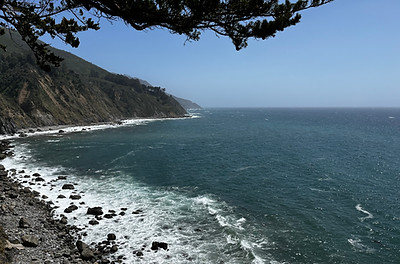The Vault

Early Track Two participants gather for a conference at Esalen Institute in Big Sur, California, USA c. 1989
For 45 years, Track Two has brought together thought leaders and field experts to forge a new path in citizen diplomacy, rooted in the human potential. In the intervening decades our work has included projects and conferences around the world, scaffolded by friendships and partnerships borne from this unique approach. Find an archive of past conferences, projects, videos, and more here, some of which have never been made available to the public before.
Through The Years
Past Conferences
%202023.jpg)
Russia-Ukraine Series
Opening New Channels for Collaboration During Conflict
April 2023
Past Projects

1988 | Union of Soviet Writers & PEN International
In 1988, Track Two hosted a delegation of renowned Soviet writers including First Secretary of the Union of Soviet Writers, Vladimir Karpov, satirist Mikhail Zhvanetsky, playwright Viktor Rozov and short-story writer Tatiana Tolstoy. The group toured the US, meeting with American contemporaries Norman Mailer, Susan Sontag, and Kurt Vonnegut. This summit facilitated the entry of the Union of Soviet Writers into PEN International, an international association of writers that monitors government censorship and promotes freedom of expression around the world. Its admission was a central event in Soviet glasnost and is considered one of Track Two’s most important contributions to the Soviet Union’s opening to free speech and democracy.

American journalist Phil Donahue and Russian journalist Vladimir Pozner discuss social and television issues between the United States and the Soviet Union on their eponymous program "Pozner & Donohue" c. 1997. (VOA, Public domain, via Wikimedia Commons)
1982 | US-Soviet Spacebridges
At the height of nuclear threat, Track Two and its partners arranged a series of interactive television links called “Spacebridges”. Beginning in 1982, these public videoconferences relied on emerging technologies of the time to enable face-to-face interaction between American and Soviet citizens, who asked each other questions and gained new perspectives. Beyond this dialogue between ordinary citizens spacebridges presented discussions in which prominent scientists, public figures, astronauts, and journalists took part. A high profile series was hosted by American media personality, film producer, and writer, Phil Donohue, and Soviet journalist and broadcaster, Vladimir Pozner. These public telecasts between the US and the USSR aired on national television in both countries and were viewed by nearly two hundred million citizens. Today, they are still shown to schoolchildren throughout Russia.

An early meeting of the Association of Space Explorers including Astronaut and Track Two participant Rusty Schweickart in France c. 1985
1985 | Association of Space Explorers
Working in tandem with astronaut Rusty Schweickert, in 1985 Track Two helped to launch the Association of Space Explorers (ASE), a professional, international organization of astronauts that provided a forum for sharing past experiences and visions for the future of space exploration. Membership is extended to those who have completed at least one Earth orbit in space, and today, ASE boasts 320 participants from 34 different countries. The Association hosts an annual forum, the “Planetary Congress of the Association of Space Explorers,” which includes press conferences and events for public audiences, as well as internal summits and lectures. It is held in a different country each year. Reference to this collaboration is frequent in the American and Russian press today.
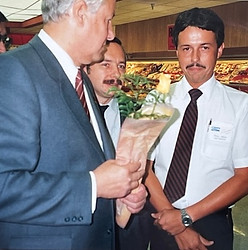
Track Two hosts Russian President Boris Yeltsin, pictured visiting an American grocery store, on his first trip to the United States, Houston, Texas, USA c. 1989
1989 | Yeltsin's First Visit to the US
In 1989, Track Two in conjunction with Esalen Institute partnered with the Foundation for Social Innovations (US and USSR) to host Boris Yeltsin on his first trip to the United States. Meetings were arranged between Mr. Yeltsin and President H.W. Bush, Vice President Dan Quayle, National Security Advisor Brent Scowcroft, former President Ronald Reagan, and other leaders in business and government. The nine days spent visiting eleven American cities gave Mr. Yeltsin his first realistic look at the United States, its people, and its government. The visit would help to influence Gorbachev’s Perestroika and Glasnost, and the ultimate introduction of democracy to the former Soviet Union.

1991 | Psychoneuroimmunology & World Health Organization
Track Two sponsored the first conference on psychoneuroimmunology, an interdisciplinary field centered upon the relationship between psychological processes and the functioning of the immune system. This conference led to dynamic Russian-American collaborative research and a subsequent conference, held at Leningrad’s Institute for Experimental Medicine in 1991. The partnership also led to the signing of a long-term agreement to work on health-related issues in the USSR with the World Health Organization.
Institute of Experimental Medicine, St. Petersburg Russia
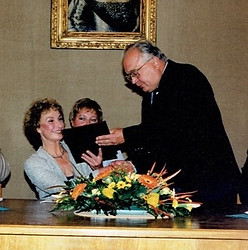
Soviet Minister of Culture Mikhail Shvydkoy presents Track Two Co-founder Dulce Murphy with a certificate of recognition at the dedication of the Loutchkov Library of Psychological Literature in Moscow, Russia c. 2000
1996 | Viatcheslav Loutchkov Library of Psychological Literature
1996 Track Two established the Library of Psychological Literature at Moscow State University and began to gather psychology books and journals from American psychologists, a collection that would form the basis of this valuable educational partnership between the United States and Russia. In 2000 the library was dedicated as the Viatcheslav Loutchkov Library of Psychological Literature at Moscow State University by Track Two. Loutchkov was a Soviet psychologist and Track Two staff member who studied the interplay of psychological, social, economic, and ideological factors in perestroika. The American Ambassador James Collins, the President of Moscow State University, and other prominent Russian academicians spoke at the dedication. Track Two has raised funds to expand the inventory of books, journals and support technology vital to the library’s growth. This is Russia’s largest English language psychology library and it is a valuable asset to the university.
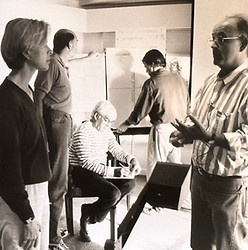
2000 | Global Business Network
Track Two partnered with the Global Business Network (GBN), an international organization that specialized in futures research and scenario planning. For its third annual benefit conference in 2000 titled “Futures For Russia,” the conference hosted representatives from Ford Motor Company, Cargill, Morgan Stanley, Saudi Aramco, Fannie Mae, and Texaco. Economist Abel Aganbegyan, technology entrepreneur Igor Kulgan, Russian writer and journalist Viktor Erofeev, financier Mac McQuown and sociologist Manuel Castells presented timely reports on the situation in Russia.
Global Business Network founders in session at a conference at Esalen institute in Big Sur, California, USA c. 1990

The American public at the US gallery showing for the Pacifica Prize in San Francisco, CA, USA c. 2014
2012 | Esalen Pacifica Prize
The Esalen Pacifica Prize was launched in 2012 as a joint project between Track Two and Esalen CTR to highlight the role of the arts in enriching and deepening ties between Russia and the former republics of the Soviet Union, and the United States across a range of common interests – cultural, scientific, business and economic. In cooperation with the California College of the Arts, based in San Francisco, and The Far Eastern Academy of the Arts in Vladivostok, a group of four young, talented artists (two graduates from each institution) were selected as the award’s first recipients. The artists, specialists in painting and drawing, then spent four weeks in May 2012 working and living together at Esalen’s campus overlooking the Pacific. During the residency of the artists, Esalen hosted a public arts weekend workshop focused on the power of art to connect and inspire new thinking about areas of common interest, with subjects ranging from Russia’s evolving role in Asia’s economy to the impact of climate change on the Pacific Ocean. Session leaders included representatives from The Asia Society, Scripps Oceanic Institute, and the Dean of the California College of the Arts.
Witness Track Two History
Participants & Relationships
Throughout the decades Track Two has collaborated with committed and insightful individuals. These include, among countless others, the following...

Valentin Berezhkov
Valentin Berezhkov served as assistant to the Soviet Minister of Foreign Affairs Vyacheslav Molotov between 1940 and 1945. Between 1941 and 1945, Berezhkov was the personal interpreter for Joseph Stalin. Later, he was the Washington DC representative of the Institute for US and Canadian Studies, a Soviet and Russian think tank for North American affairs. In 1991 Berezhkov moved to Claremont, CA to teach and lecture on Russian-American affairs at the Claremont Colleges. His authored works include a memoir titled At Stalin's Side.
Berezhkov participated in Track Two conferences in 1983, 1997 and in the Russian-American Dialogues at Esalen where he shared his experiences as Stalin’s interpreter, including his service at many of the major meetings of world leaders, including The Tehran Conference, attended by Stalin, Roosevelt and Churchill.
Joseph Stalin's Personal Interpreter
Author
National Archives and Records Administration, Public Domain, via Wikimedia Commons

Rusty Schweickart
Russell Louis "Rusty" Schweickart is an aeronautical engineer, former NASA astronaut, US Air Force fighter pilot, research scientist, and former executive. In his early years, Schweickart served in the US Air Force and Massachusetts Air National Guard. He then worked as a research scientist at the Massachusetts Institute of Technology's Experimental Astronomy Laboratory where his work centered on upper atmospheric physics, star tracking and stabilization of stellar images.
In 1963, Schweickart was chosen to join NASA's Astronaut Group 3 and was the Lunar Module Pilot on the 1969 Apollo 9 mission, the first crewed flight test of the lunar module. he also manned other space missions in the 1970's.
Following his work in space, Schweickart served as Director of User Affairs in NASA's Office of Applications before leaving the agency in 1977 when appointed as science and technology advisor by California Governor Jerry Brown. He was then appointed by Governor Brown to California's Energy Commission for five years, for three of which he served as Chairman.
In 1984, Schweickart, along with several Soviet counterparts, and with support from Track Two launched the Association of Space Explorers (ASE), a professional, international organization of astronauts. This was the first forum in which Russian and American astronauts and cosmonauts could share their experiences in space and their hopes for the future of space exploration. Membership is extended to those who have completed at least one Earth orbit in space, and today, ASE boasts 320 participants from 34 different countries.
Aeronautical Engineer
NASA Astronaut
NASA, Public Domain, via Wikimedia Commons

Michael Murphy
Michael Murphy is the co-founder of the Esalen Institute and a leading figure in the human potential movement. Murphy founded Esalen's Center for Theory and Research and is the author of The Future of the Body and other books on topics related to the extraordinary human potential.
Murphy's authored works incliude: The Kingdom of Shiva's Irons, Jacob Atabet, An End to Ordinary History, and God and the Evolving Universe. He has co-authored: God and the Evolving Universe, In the Zone: Transcendent Experience in Sports, The Life We Are Given, andThe Physical and Psychological Effects of Meditation.
Michael Murphy, along with his partner Dulce Murphy, co-founded the Esalen Soviet-American Exchange Program, the antecedent to Track Two. Murphy has served as an advisor since 2004, when Track Two became an independent nonprofit organization in order to expand its reach beyond Russia, into the Middle East and the North Pacific Rim.
Co-founder, Esalen Institute
Author

Norman Mailer
Norman Mailer was a prominent writer, activist, and filmmaker whose signature style blended provocation with explorations of complex themes in post-war American society, including power, masculinity, and the darker side of the American Dream. He gained national recognition with his debut novel The Naked and the Dead which drew on his experiences as a soldier in WWII. Mailer is considered a pioneer of "creative non-fiction," a genre that melds the style and devices of literary fiction with factual journalism. He was a controversial cultural commentator and critic, known for his bold opinions and persona and his desire to debate issues of politics, culture, and the artist's role in society.
Track Two first met Mailer in 1984. In 1988, he was among the esteemed American writers (including Susan Sontag and Kurt Vonnegut) with whom Track Two's second delegation of prominent Soviet writers met while touring the US. This meeting led to a friendship which ultimately facilitated the entry of the Soviet Writers’ Union into the International PEN association, a central event of Soviet glasnost. PEN International, as it’s now called, monitors government censorship and freedom of expression around the world.
Writer
Filmmaker
Gotfryd, Bernard, photographer, Public Domain, via Wikimedia Commons

Abel G. Aganbegyan
Abel G. Aganbegyan began his career working for the Soviet government developing salary policy in the USSR. He became an active member of a cohort of mathematical economists that rose to prominence in the 1960s. In the late 1980s he served as one of Mikhail Gorbachev's chief economists and was among the first to voice the need for restructuring the existing Soviet economic and business infrastructure.
In 1988, Track Two hosted Aganbegyan, then Rector of the National Academy of the Economy, for his first tour of the United States as one of Gorbachev’s chief economic advisors. In 1990, he was on a panel of Soviet and American scholars who selected the winners of the Furth Ruble Prize for the best proposals offering a practical solution to the question of ruble convertibility in international trade, offered by partners the Furth Foundation, Esalen Institute, and the USSR Academy of Sciences.
In 1998, he participated in second Track Two Benefit Conference titled "Russia in Crisis," offering up-to-date information on the Russian financial crisis of that year. The following year, Aganbegyan attended a third Track Two Benefit Conference, co-sponsored by the Global Business Network, titled "Futures for Russia" where he once more provided up-to-the minute reports on the developing economic circumstances in Russia.
In 2003, he joined a meeting of Track Two at Moscow's Literary Gazette Headquarters where attendees explored the importance of setting a constructive policy toward Muslim minorities in Russia and the United States and sought ways to address the downturn in Russian-American relations. Dr. Agenbegyan has contributed a powerful interview to the Track Two History project.
Gorbachev's Chief Economic Officer
Leading Soviet-Russian Economist
A.Savin, CC BY-SA 3.0 , via Wikimedia Commons

Erik Erikson
Erik Erikson was a renowned developmental psychologist, psychoanalyst, and Pulitzer-award winning author best known for his theory of psychosocial development which remains foundational in the field to this day. The theory outlines the eight stages of psychosocial development from infancy to old age, with each presenting a "conflict" that must be resolved for healthy psychological development.
Erikson's work emphasizes the lifelong process of identity formation and the interplay between personal growth and environmental influences. He is credited as one of the originators of ego psychology and counted among his influences the work of Anna and Sigmund Freud. Among his many celebrated works, Childhood and Society, Identity: Youth and Crisis, and Ghandi's Truth: On the Origins of Militant Nonviolence are but a few regularly referenced today.
Beginning in 1983, Erikson participated in four Track Two symposia on the political psychology of Soviet-American relations alongside career diplomat, peace studies academic, and founding Track Two participant, Joseph Montville. These meetings resulted in a special edition of the quarterly journal Political Psychology titled “A Notebook on the Psychology of the US-Soviet Relationship," edited by Montville.
Developmental Psychologist
Psychoanalyst
Erik Erikson at Esalen Institute c. 1982
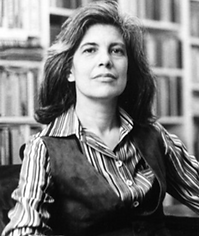
Susan Sontag
Susan Sontag was a celebrated American writer, filmmaker, critic, and activist notable for her keen perspective on the intersection of art and society. Her body of work challenges conventional thinking, advocating for deeper engagement with the arts and critical examinations of the state of society and cultural norms. In 1977, Sontag published On Photography, a collection of essays examining the history and contemporary role of photography in society, and exploring the relationship between photography, politics, and the tension between recording and intervention.
In 1988, Track Two hosted its second delegation of prominent Soviet writers who toured the US and met with American contemporaries, including Susan Sontag, Norman Mailer, Kurt Vonnegut, and others. This meeting led to a collaborative friendship that ultimately facilitated entry of the Union of Soviet Writers into the International PEN association. This entry would serve as a central event in Soviet glasnost. PEN International, as its now called, monitors government censorship and freedom of expression around the world.
Writer
Filmmaker
Activist
Critic
Lynn Gilbert, CC BY-SA 4.0 , via Wikimedia Commons

Joseph Montville
Joseph Montville was a career Foreign Service Officer, with posts in the Middle East and North Africa, and one of Track Two's founding members. In addition to his foreign service, he also worked in the State Department’s Bureaus of Near Eastern and South Asian Affairs and Intelligence and Research. There, he served as chief of the Near East Division and director of the Office of Global Issues.
Following his distinguished service career, Montville directed the Program on Healing Historical Memory at George Mason University's School for Conflict Analysis and Resolution, served as Senior Advisor on Interfaith Relations at Washington National Cathedral, a Distinguished Diplomat in Residence at American University and founded the preventive diplomacy program at Washington, DC’s Center for Strategic and International Studies.
In 1980, at one of the earliest gathers of the Track Two network (then under the name Esalen Soviet-American Exchange Program), he pioneered the term "track two diplomacy," a style of diplomacy that emphasizes informal dialogue and negotiation between non-governmental actors in conflict situations. The term is now a formally recognized approach to international diplomacy.
Among his countless contributions to Track Two, Montville served as chairman of the Board, led the International Abrahamic Network (IAN), and advised on matters of middle east and Russian-American diplomacy. In 1992, he moderated the first meeting held at the newly founded Gorbachev Center in Moscow which counted among its attendees the Center's namesake and the last president of the Soviet Union, Mikhail Gorbachev.
Foreign Service Officer
Political Scientist
Joseph Montville in Jerusalem c. 2014

Viktor Erofeev
Viktor Erofeev is a celebrated Russian author, television, and radio personality. He contributed significant works to the 1980s Soviet glastnost period, including Metropol, a literary anthology that included texts banned under Soviet censorship penned by well-known authors of the era. The anthology was published via 'samizdat,' a form of political dissidence that saw the reproduction and distribution of underground publications. As a result of this work, Erofeev was expelled from the Union of Soviet Writers and barred from mainstream publishing until 1988.
In 1989, he received global attention for his novel Russian Beauty which has been translated into 27 languages around the world, and his body of work has been met with international acclaim throughout the ensuring decades. He regularly contributes to The Times Literary Supplement, The New Yorker, The New York Review of Books, The International Herald Tribune, Frankfurter Allgemeine, and Die Welt.
In 1999, Erofeev joined the Track Two network after attending the third annual Track Two Benefit Conference (co-sponsored with the Global Business Network) titled "Futures for Russia" There he offered his observations and perspectives on the then strained climate in Russia. In the intervening decades, Erofeev has served Track Two as both a longtime participant and advisor to Track Two, offering his incisive perspective on myriad issues.
Writer
Literary Critic
Viktor Erofeev at the Murphy House, Esalen Institute in Big Sur, California, USA c. 1990

Sergei Kapitsa
Sergei Kapitsa was a Russian physicist and demographer, heavily responsible for science popularization in the Soviet Union. He is best known as the host of the long-running scientific television show "Evident, but Incredible" for which he was awarded UNESCO's 1979 Kalinga Prize for the Popularization of Science. Beginning in 1982, Kapitsa edited the Russian edition of Scientific American. He also served as the vice president of the Russian Academy of Natural Sciences and president of the Eurasian Physical Society.
Throughout the 1980s he, along with American counterpart Carl Sagan, spoke out about the possibility of a nuclear winter as the result of international nuclear war, presenting their grave concerns to both the United States Senate and the United Nations. Kapitsa was a proponent of planetary exploration and sat on the advisory council for the US-based Planetary Society.
In 2003, Kapitsa joined a Track Two meeting at Moscow's Literary Gazette Headquarters where attendees sought ways to address the downturn in Russian-American relations.
Physicist
Demographer
Fotofelix59, CC BY-SA 4.0, via Wikimedia Commons
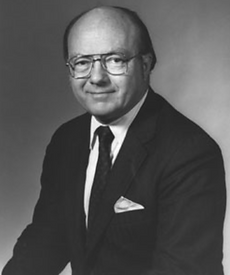
Jack F. Matlock, Jr.
Jack F. Matlock, Jr. is a distinguished American diplomat and historian, who served as the American Ambassador to the Soviet Union in the pivotal years leading up to the end of the Cold War. As a Foreign Service Officer, Matlock dedicated much of his career to US-Soviet relations and his extensive experience working in and studying Eastern Europe - particularly Russian history and culture - rendered him a key figure in the negotiations that alleviated Cold War tensions. In addition to his placement in the Soviet Union, he also served the Foreign Service in Ghana and Tanzania, and as Special Assistant to the President and Senior Director of European and Soviet Affairs on the National Security Council.
Following his service, Matlock continued his contribution to the field of international relations as an academic and public speaker, authoring books and articles analyzing the Cold War, its legacy, diplomacy, and the dynamics of contemporary geopolitics. He has been a lecturer on diplomacy at some of the top universities in the the United States.
In 2010, Matlock joined a Track Two gathering of outstanding Russians and Americans to address the paradoxical deterioration of relations between the two nations in the 2000s at a time of unprecedented opportunity for transnational cooperation.
The following year, he took part in a series of meetings with a core group of Track Two network members which set the stage for the creation of the Esalen Pacifica Prize. The prize was awarded to artists from the United States' California College for the Arts and Russia's Far Eastern Academy of the Arts who then spent four weeks living and working together at Esalen Institute in an effort to create new and enduring connections between the artistic and greater communities from their home countries. Also stemming from those meetings was Track Two's 2012 conference "COLD WAR II – How Intelligence and Media Shape Public Perceptions" held in Paris.
Last American Ambassador, USSR
Foreign Service Officer
United States Department of State, Public Domain, via Wikimedia Commons

Vladimir Pozner
Vladimir Pozner is a French-born Russian-American journalist and author who gained global recognition for his representations and articulations of Soviet perspectives during the Cold War. From the 1970s through the 1990s, he made regular appearances in American media, and having lived in Western Europe, the United States, and the Soviet Union, he was uniquely positioned to bridge cultural divides between the US and USSR.
In the mid-1980s, Pozner and American television personality Phil Donohue co-hosted a groundbreaking series of interactive televised discussions via satellite between audiences in the United States and the Soviet Union called "Spacebridges" and arranged by Track Two and a series of partners.
Pozner founded the School for Television Excellence in Moscow and served as president of the Russian Television Academy. He went on to host a number of popular Russian television programs, including the eponymous "Pozner".
During his long history as advisor to Track Two, Pozner has contributed to countless conferences and convenings held between Russia and America. In 2019, Pozner was a keynote speaker at Track Two's Whom Do We Trust conference which brought Russian and American university students together with Track Two members for intimate dialogue on four global threats: climate change, mass migration, cyber systems and nuclear expansion.
Journalist
Television Presenter
Author
Dmitry Rozhkov, CC BY-SA 3.0, via Wikimedia Commons

Daniel Ellsberg
Daniel Ellsberg was an activist, economist, and US military analyst who was widely recognized for his extensive studies on nuclear weapons and nuclear policy. While under the employ of the RAND corporation, he rose to prominence for releasing the Pentagon Papers, a top-secret report on governmental decision-making in relation to American involvement in the Vietnam War, to newspapers including The New York Times and The Washington Post.
Ellsberg continued his anti-war activism following the end of the Vietnam War, critiquing US military action in the middle east and the military industrial complex's role in the Ukraine War. In 2017, he published The Doomsday Machine: Confessions of a Nuclear War Planner, a book outlining his overriding concerns surrounding the nuclear threat. Ellsberg contributed his knowledge of nuclear systems to several Track Two conferences over his many years of involvement.
Activist
Economist
US Military Analyst
Gotfryd, Bernard, photographer, Public Domain, via Wikimedia Commons

Sam Keen
Sam Keen is an American author, professor, and philosopher known for his explorations of the human experience and search for meaning. His work examines questions of spirituality, psychology, gender dynamics, and the nature of relationships made accessible through a writing style that combines personal narrative and philosophical inquiry.
Keen rose to prominence with his book Fire in the Belly, which was regarded as groundbreaking within the men's consciousness movement and examined how men defined themselves in the changing social climate of the time, presenting a revolutionary view of masculinity. He has emphasized the role of storytelling and myth in understanding the self and one's place in the world.
He was a contributing editor for Psychology Today for over 20 years, and he co-produced a documentary film adaptation of his book Faces of the Enemy exploring how individuals and nations dehumanize their enemies to justify the inhumanity of war.
In 1983, prior to the release of his book by the same name, Keen was an honored speaker at Track Two's "Faces of the Enemy" conference. Other guests included anthropologist Ashley Montagu, poet and essayist Robert Bly, and Soviet diplomat Valentin Berezhkov. The following year, Track Two hosted Sam Keen once more for a follow-up gathering.
Author & Lecturer
Philosopher
George Quasha, CC BY 3.0 , via Wikimedia Commons
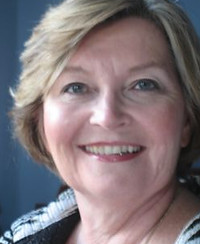
Antonina W. Bouis
Antonina W. Bouis has translated many contemporary Russian writers including Solomon Volkov, Sergei Dovlatov, Yevgeny Yevtushenko, Stas Namin, and Sergei Lebedev. As executive director of George Soros's foundations in the USSR, she traveled extensively to represent him, often with the writers whose work she translated, as well as with her journalist husband and their son. Her 100-plus translations for major publishers range from memoirs (Sakharov, Bonner, Plisetskaya), economic history (Yavlinsky, Gaidar), and art (Malevich, Kabakov) to fiction (Voznesensky, Rybakov, Bulgakov, Aksyonov, and Radzinsky).
Bouis is on the boards of Track Two: An Institute for Citizen Diplomacy and the Andrei Sakharov Foundation. Fluent in Russian and French, she holds a master's degree from Columbia University and is a graduate of Barnard College.
Literary Translator

Tatyana Tolstaya
Tatyana Tolstaya is a Russian writer and television host. A member of the illustrious Tolstoy family, she gained recognition for her short stories and novels that examined the intricacies of Russian life and reimagined the future of the post-Soviet state. In 1987 her collection of short stories "On the Golden Porch" was translated into English by Track Two board member Antonina W. Bouis to glowing reviews. After emigrating to the US in 1990, Tolstaya taught Russian literature and creative writing at some of the top universities in the country. She then turned towards journalism, contributing to American publications including The New York Review of Books, The New Yorker, The Times Literary Supplement, the Wilson Quarterly as well as Russia-based publications.
At other points in her career, Tolstaya worked as a speechwriter for the Russian political party Union of Right Forces and co-hosted the Russian television program "The School for Scandal," conducting interviews with diverse representatives of contemporary Russian culture and politics. Tolstaya is the great-grandniece of renowned author Leo Tolstoy.
In 1988, she took part in Track Two's second delegation of eminent Soviet writers and met with prominent American writers of the time, including Susan Sontag, Norman Mailer, and Kurt Vonnegut. This collaboration ultimately resulted in the entry of the Union of Soviet Writers into the International PEN Association (now called PEN International) which monitors government censorship and freedom of expression around the world. This entry served as a central event in Soviet glasnost.
Writer
Television Host
Mark Nakoykher, CC BY-SA 4.0, via Wikimedia Commons
Masha Vorontsova
In addition to serving as an advisor to Track Two, Masha is a Marine Conservation professional. She has arranged partnerships with policymakers internationally and in Russia and the former Soviet States and has a cross-cultural skill set identifying her as a change agent for positive environmental impact and awareness. She has extensive global experience with knowledge on conventions (CITES, CMS, IWC, CBD) and new UN BBNJ, as well as with international organizations IUCN, UN, UNEP, UNESCO, World Bank, and EBRD.
Vorontsova is a marine biologist with a postgraduate degree from the Institute of Developmental Biology, N.Koltsov. Her research has taken her to Vietnam, Canada, the US and across Russia. She currently leads efforts to assure scientists working on ocean health are able to access the data they require to make informed assessments of arctic and antarctic conditions. She has connected hundreds of colleagues to the Track Two network.
Marine Conservationist

Masha Vorontsova at Whom Do We Trust 2019, St. Petersburg, Russia c. 2019
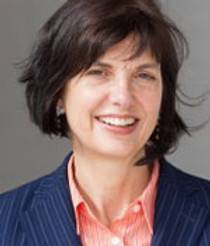
Lizbeth Hasse
Lizbeth Hasse is a lawyer, negotiator, mediator and arbitrator (J.D. and M.A., University of California, Berkeley) with an international practice. She has managed resolution of high-profile commercial disputes involving such entities as Intel, SONY, Apple, Warner Bros., CBS, Bank of America and many others, and designs resolutions for human rights disputes involving indigenous and displaced populations worldwide. Hasse is certificated by the United Nations Training Program in Civilian Personnel of Peace-keeping, Mediation and Election Monitoring at the International Faculty of Scola St’Ana, Pisa, and has used her skills in international mediation and negotiation in such places as St. Petersburg, Russia; Kyrgyzstan’s Fergana Valley; the Peruvian Amazon; the Philippines and West Africa. With a deep expertise in Intellectual Property, Media and Civil Law, Hasse has helped draft or implement new legislation in Eastern European, African, Asian and Central Asian countries. Her advisory work has been supported by the MacArthur Foundation, Soros, Rockefeller Fund and Washington Research Institute.
Hasse enjoys the new problems presented in copyright law and writes about IP law and negotiations. She was a Fulbright Fellow (France). Along with serving on the board of Track Two she has served on the Board of Heart To Heart International Children’s Medical Alliance where she shepherded programs in Russia and the former Soviet States. She has also served on the boards of the Presidio Graduate School and the Founding Board of the Edible Schoolyard in Berkeley, California.
Lawyer
Negotiator
Mediator
Arbitrator

